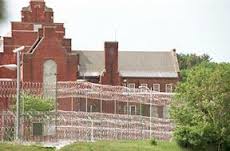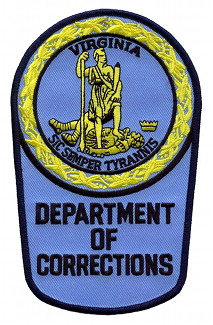Related Research Articles
Prison sexuality consists of sexual relationships between prisoners or between a prisoner and a prison employee or other persons to whom prisoners have access. Since prisons are usually separated by sex, most sexual activity is with a same-sex partner. Exceptions to this include sex with spouses/partners during conjugal visits and sex with a prison employee of the opposite sex.

Bedford Hills Correctional Facility for Women, a women's prison in the town of Bedford, New York, is the only maximum security New York State women's prison. The prison previously opened under the name Westfield State Farm in 1901. It lies just outside the hamlet and census-designated place Bedford Hills, New York.

Rikers Island is a 413-acre (167.14-hectare) prison island in the East River in the Bronx that contains New York City's largest jail.
Prison rape commonly refers to the rape of inmates in prison by other inmates or prison staff. In 2001, Human Rights Watch estimated that at least 4.3 million inmates had been raped while incarcerated in the United States. A United States Department of Justice report, Sexual Victimization in Prisons and Jails Reported by Inmates, states that "In 2011–12, an estimated 4.0% of state and federal prison inmates and 3.2% of jail inmates reported experiencing one or more incidents of sexual victimization by another inmate or facility staff in the past 12 months or since admission to the facility, if less than 12 months." However, advocates dispute the accuracy of the numbers, saying they seem to under-report the real numbers of sexual assaults in prison, especially among juveniles.

The California Department of Corrections and Rehabilitation (CDCR) is the penal law enforcement agency of the government of California responsible for the operation of the California state prison and parole systems. Its headquarters are in Sacramento.

Central California Women's Facility (CCWF) is an American women's California Department of Corrections and Rehabilitation state prison located in Chowchilla, California. It is across the road from Valley State Prison. CCWF is the second largest female correctional facility in the United States, and houses the only State of California death row for women.

The United States Penitentiary, Coleman I and II are high-security United States federal prisons for male inmates in Florida. It is part of the Coleman Federal Correctional Complex and is operated by the Federal Bureau of Prisons, a division of the United States Department of Justice. USP Coleman I was opened in 2001, and in 2004 Clark Construction completed a 555,000-square-foot (51,600 m2) additional component for USP Coleman II.
Edna Mahan Correctional Facility for Women is a prison facility for women of the state of New Jersey Department of Corrections, located in Union Township, Hunterdon County, New Jersey, near Clinton. Its official abbreviation is EMCFW. The facility was named for Edna Mahan, one of the first female correctional superintendents in the U.S.

The Virginia Department of Corrections (VADOC) is the government agency responsible for community corrections and operating prisons and correctional facilities in the Commonwealth of Virginia in the United States. The agency is fully accredited by the American Correctional Association and is one of the oldest functioning correctional agencies in the United States. Its headquarters is located in the state capital of Richmond.

The New York State Department of Corrections and Community Supervision (NYSDOCCS) is the department of the New York State government that administers the state prison and parole system, including 44 prisons funded by the state government.
Kentucky Correctional Institution for Women (KCIW) is a prison located in unincorporated Shelby County, Kentucky, near Pewee Valley, Kentucky, operated by the Kentucky Department of Corrections. Male and female inmates prior to 1937 had been housed at the Kentucky State Penitentiary in Frankfort
The Mabel Bassett Correctional Center (MBCC) is an Oklahoma Department of Corrections prison for women located in unincorporated Pottawatomie County, Oklahoma, near McLoud. The facility houses 1241 inmates, most of whom are held at medium security. It is the largest female prison in Oklahoma.

Opened in 1969, Georgia Diagnostic and Classification Prison (GDCP) is a Georgia Department of Corrections prison for men in unincorporated Butts County, Georgia, near Jackson. The prison holds the state execution chamber. The execution equipment was moved to the prison in June 1980, with the first execution in the facility occurring on December 15, 1983. The prison houses the male death row, while female death row inmates reside in Arrendale State Prison.
Death row, also known as condemned row, is a place in a prison that houses inmates awaiting execution after being convicted of a capital crime and sentenced to death. The term is also used figuratively to describe the state of awaiting execution, even in places where no special facility or separate unit for condemned inmates exists. In the United States, after an individual is found guilty of a capital offense in states where execution is a legal penalty, the judge will give the jury the option of imposing a death sentence or life imprisonment without the possibility of parole. It is then up to the jury to decide whether to give the death sentence; this usually has to be a unanimous decision. If the jury agrees on death, the defendant will remain on death row during appeal and habeas corpus procedures, which may continue for several decades.

Lesbian, gay, bisexual, transgender and queer (LGBTQ) people face difficulties in prison such as increased vulnerability to sexual assault, other kinds of violence, and trouble accessing necessary medical care. While much of the available data on LGBTQ inmates comes from the United States, Amnesty International maintains records of known incidents internationally in which LGBTQ prisoners and those perceived to be lesbian, gay, bisexual or transgender have suffered torture, ill-treatment and violence at the hands of fellow inmates as well as prison officials.
In the United States, the rights of transgender people vary considerably by jurisdiction. In recent decades, there has been an expansion of federal, state, and local laws and rulings to protect transgender Americans; however, many rights remain unprotected, and some rights are being eroded. Since 2020, there has been a national movement by conservative/right-wing politicians and organizations to target transgender rights. There has been a steady increase in the number of anti-transgender bills introduced each year, especially in Republican-led states.

The history of violence against LGBT people in the United States is made up of assaults on gay men, lesbians, bisexuals, and transgender individuals (LGBTQ), legal responses to such violence, and hate crime statistics in the United States of America. The people who are the targets of such violence are believed to violate heteronormative rules and they are also believed to contravene perceived protocols of gender and sexual roles. People who are perceived to be LGBT may also be targeted for violence. Violence can also occur between couples who are of the same sex, with statistics showing that violence among female same-sex couples is more common than it is among couples of the opposite sex, but male same-sex violence is less common.

Approximately 741,000 women are incarcerated in correctional facilities, a 17% increase since 2010 and the female prison population has been increasing across all continents. The list of countries by incarceration rate includes a main table with a column for the historical and current percentage of prisoners who are female.
Telfair State Prison is a Georgia Department of Corrections state prison for men located on 210 Long Bridge Road, Helena, Telfair County, Georgia, United States. The facility opened in 1992 and currently has a capacity of 1420 prisoners. The Department of Justice opened a criminal investigation of the Georgia State Prisons in 2021 after widespread reports and documentation of violence, assaults and harassment, particularly of transgender, lesbian and gay prisoners.
Valdosta State Prison is a Georgia Department of Corrections state prison for men located in Valdosta, Lowndes County, Georgia.
References
- ↑ "Ashley Diamond, Transgender Georgia inmate, released early from prison — LGBT Institute". lgbtinstitute.org. September 2015. Archived from the original on 2016-10-20. Retrieved 2016-10-20.
- 1 2 "Ashley Diamond". Center for Constitutional Rights. Archived from the original on 2021-04-04. Retrieved 2020-11-24.
- ↑ Sontag, Deborah (September 24, 2015). "Ashley Diamond, Transgender Inmate, Is Out of Prison but Far From Free" . The New York Times . Archived from the original on May 25, 2021. Retrieved October 20, 2016.
- ↑ "Transgender inmate Ashley Diamond released from Georgia prison after pressure from SPLC lawsuit | Southern Poverty Law Center". splcenter.org. Archived from the original on 2016-10-20. Retrieved 2016-10-20.
- ↑ Brekke, Kira (September 10, 2015). "Freed Trans Woman Ashley Diamond On Life Behind Bars In Men's Prison". The Huffington Post . Archived from the original on February 22, 2017. Retrieved October 20, 2016.
- ↑ Abeni, Cleis (February 12, 2016). "Trans Woman Ashley Diamond Reaches Settlement with Ga. Dept. of Corrections". The Advocate . Archived from the original on October 20, 2016. Retrieved October 20, 2016.
- ↑ "Transgender inmate Ashley Diamond reaches settlement with Georgia's Department of Corrections | GLAAD". glaad.org. 2016-02-12. Archived from the original on 2016-06-09. Retrieved 2016-10-20.
- 1 2 3 4 5 6 7 8 9 10 11 12 13 14 Dewan, Shaila (November 23, 2020). "Back in Prison, Transgender Woman Faces an Old Horror, Sexual Assault" . The New York Times . Archived from the original on November 23, 2020. Retrieved November 24, 2020.
- 1 2 Jones, Zoe Christen (November 24, 2020). "Transgender inmate sues Georgia prison officials over alleged assaults". CBS News. Archived from the original on November 24, 2020. Retrieved November 24, 2020.
- ↑ Aspegren, Elinor (November 23, 2020). "Black transgender woman sues Georgia Department of Corrections for second time, alleging constant 'fear of sexual assault'". USA Today . Archived from the original on November 23, 2020. Retrieved November 24, 2020.
- ↑ "Transgender Woman Suing Georgia Department of Corrections a Second Time for Sexual Assaults in Men's Prisons Is Finally Released". Center for Constitutional Rights. Archived from the original on 2023-07-10. Retrieved 2023-06-19.
- ↑ "Transgender woman drops lawsuit against Georgia prison officials". WSB-TV Channel 2 - Atlanta. 2023-01-20. Archived from the original on 2023-07-10. Retrieved 2023-06-19.
- ↑ "Ashley Diamond to Forego Trial to Focus on Healing". Center for Constitutional Rights. Archived from the original on 2023-07-10. Retrieved 2023-06-19.
- ↑ TEGNA. "Transgender woman: I was raped, mistreated in Georgia prison". WXIA-TV . Retrieved October 20, 2016.[ dead link ]
- ↑ Riquelmy, Alan (September 14, 2014). "Rome transgender woman files suit against state DOC from prison". Rome News-Tribune . Archived from the original on April 4, 2021. Retrieved November 24, 2020.
- ↑ Trans Woman Ashley Diamond Fights for Prison Reform in Georgia: GAYCATION (Clip), 29 September 2016, archived from the original on 2023-07-10, retrieved 2023-07-10